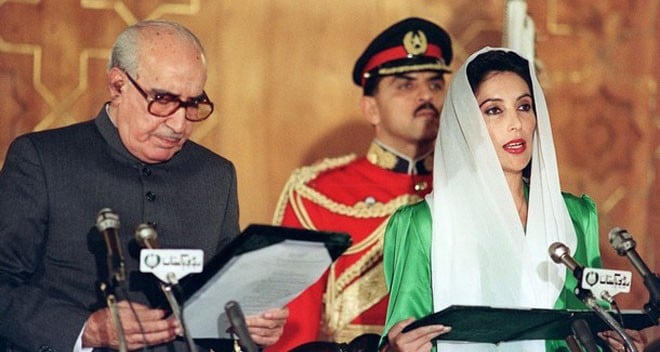
Hopefully politicians today have learnt from the tumultuous decade -- 1988 to 1999

Dear all,
Flashback to the first week of August 1990 and a key date in Pakistan’s recent political history -- August 6 -- when the democratically elected civilian government was dismissed by a hostile, establishment-inclined President.
Ghulam Ishaq Khan, a former bureaucrat and Zia regime protégé, became President only because his predecessor General Zia ul Haq was killed suddenly in plane crash and as Senate Chairman, he had been the next in line for the post. As an occupant of this office he generated quite a few memories for us: not really visually as he was a tall, fairly dour looking man with not much range of expression, but in terms of his television speeches certainly. The first was, of course, in 1988 when he had to announce the death of his leader (‘maaboob sadar … ka tayara putt gaya’). The second memorable speech he made was after he dismissed the first Benazir Bhutto government in August 1990, when he explained how he’d been compelled to take this action because he could "no longer bear to see the dreadful malpractices and rampant corruption of the government."
He was, he explained, trying to save the country.
People who dismiss governments always do so in order to save the country and never, ever, because they are megalomaniacs with vested interests, establishment links, or financial ambitions. At least that is what Generals Zia and Musharraf and Presidents Ghulam Ishaq and Farooqi Leghari professed.
So that is what the president claimed to do in August 1990 when the first government of Benazir Bhutto was dismissed, just 20 months into its term. It was a shocking event when it happened because it was a harsh reminder that nothing had really changed in terms of who was running the country -- elections or no elections, Zia or no Zia. The dismissal was carried out in a manner to generate maximum humiliation: in the morning Benazir Bhutto was the elected Prime minister of Pakistan, going about her work in the PM House in Islamabad, but by the evening she had been unceremoniously sent home to Karachi. Kicked out, sent home in disgrace.
At that time the national response was fairly muted because of various reasons: one was that the opposition was headed by Nawaz Sharif who was at that time the army establishment’s favoured politician and whose government in Punjab had taken an extremely aggressive stance against the PPP government in the Centre. Sharif was happy to condone the President’s action (made possible by General Zia’ constitutional Amendment, the infamous 58-2-B), oblivious to the fact that, ironically, he would suffer exactly the same fate three years later.
The public response to the 1990 dismissal had been conditioned by a long-running whispering campaign against the new government. Newspaper reports and rumours of the PPP government’s corrupt and inefficient practices were combined with accusations and insinuations about their ‘patriotism’ or lack thereof; it was implied that they were selling out to India by backtracking on the Kashmir issue. To a great extent the ground had been prepared for the action in terms of public opinion -- and even quite intelligent, well meaning people failed to see what a terribly harmful and anti-democratic development this was for Pakistan.
After her dismissal Bhutto claimed that the establishment had, from the start, in place ‘a master plan to defame’ her. It sounded overly dramatic then -- but in retrospect is quite credible. Civilian governments who refuse to toe the line of the military establishment lead a beleaguered existence. They have to fight on various fronts and must tread very carefully, they are beset by ‘crisis’ after crisis and they are aware that their legislators can be ‘turned’ by various means.
In the decade between 1988 and 1999, five political governments were dismissed. It was a tumultuous decade but one from which the best of Pakistan’s politicians now seemed to have learnt a lesson: that only with the strengthening of the system of parliamentary democracy and a unified political stand against any threats to this will they be able to consolidate civilian power. August 6 happened two and a half decades ago, but some form of such a dismissal remains a possibility even today.
It would be quite nice if we could learn from History.
Best Wishes